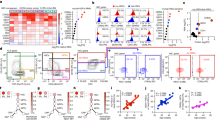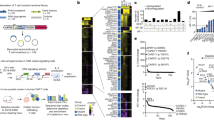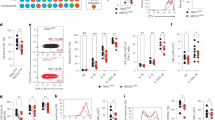Abstract
The hallmark of T-cell activation is the production of interleukin 2 (IL-2). c-Jun amino-terminal kinase (JNK), a MAP kinase that phosphorylates c-Jun and other components of the AP-1 group of transcription factors1,2, has been implicated in the activation of IL-2 expression3,4. Previously, we found that T cells from mice deficient in the Jnk1 or Jnk2 gene can be activated and produce IL-2 normally, but are deficient in functional differentiation into Th1 or Th2 subsets5,6. However, studies of mice with compound mutations indicate that JNK1 and JNK2 are redundant during mouse development7. Here we use three new mouse models in which peripheral T cells completely lack JNK proteins or signalling, to test whether the JNK signalling pathway is crucial for IL-2 expression and T-cell activation. Unexpectedly, these T cells made more IL-2 and proliferated better than wild-type cells. However, production of effector T-cell cytokines did require JNK. Thus, JNK is necessary for T-cell differentiation but not for naive T-cell activation.
This is a preview of subscription content, access via your institution
Access options
Subscribe to this journal
Receive 51 print issues and online access
$199.00 per year
only $3.90 per issue
Buy this article
- Purchase on Springer Link
- Instant access to full article PDF
Prices may be subject to local taxes which are calculated during checkout





Similar content being viewed by others
References
Ip,Y. T. & Davis,R. J. Signal transduction by the c-Jun N-terminal kinase (JNK)—from inflammation to development. Curr. Opin. Cell Biol. 10, 205–219 (1998).
Li,B., Tournier,C., Davis,R. J. & Flavell,R. A. Regulation of IL-4 expression by the transcription factor JunB during T helper cell differentiation. EMBO J. 18, 420–432 (1999).
Su,B. et al. JNK is involved in signal integration during costimulation of T lymphocytes. Cell 77, 727– 736 (1994).
Matsuda,S., Moriguchi,T., Koyasu,S. & Nishida,E. T-Lymphocyte activation signals for Interleukin-2 production involve activation of MKK6-p38 and MKK7-SAPK/JNK signaling pathways sensitive to cyclosporin A. J. Biol. Chem. 273, 12378–123782 (1998 ).
Dong,C. et al. Defective T-cell differentiation in the absence of Jnk1. Science 282, 2092–2095 ( 1998).
Yang,D. D. et al. Differentiation of CD4+ T cells to Th1 cells requires MAP kinase JNK2. Immunity 9, 575–585 (1998).
Kuan,C. Y. et al. The Jnk1 and Jnk2 protein kinases are required for regional specific apoptosis during early brain development. Neuron 22 , 667–676 (1999).
Weiss,L. et al. Regulation of c-Jun NH2-terminal kinase (JNK) gene expression during T-cell activation. J. Exp. Med. 191, 139–145 (2000).
Rincon,M. et al. The JNK pathway regulates the in vivo deletion of immature CD4(+)CD8(+) thymocytes. J. Exp. Med. 188, 1817– 1830 (1998).
Schorle,H., Holtschke,T., Hunig,T., Schimpl,A. & Horak,I. Development and function of T cells in mice rendered interleukin-2 deficient by gene targeting. Nature 352, 621–624 (1991).
Nourse,J. et al. Interleukin 2-mediated elimination of the p27Kip1 cyclin-dependent kinase inhibitor prevented by rapamycin. Nature 372 , 570–573 (1994).
Gomez,J., Gonzalez,A., Martinez A., C. & Rebollo,A. IL-2-induced cellular events. Crit. Rev. Immunol. 18 , 185–220 (1998).
Nishina,H. et al. Impaired CD28-mediated interleukin 2 production and proliferation in stress kinase SAPK/ERK1 kinase (SEK1)/mitogen-activated protein kinase kinase 4 (MKK4)-deficient T lymphocytes. J. Exp. Med. 186, 941–953 (1997).
Swat,W. et al. SEK1/MKK4 is required for maintenance of a normal peripheral lymphoid compartment but not for lymphocyte development. Immunity 8, 625–634 (1998).
Tournier,C., Whitmarsh,A. J., Cavanagh, J., Barrett,T. & Davis,R. J. Mitogen-activated protein kinase kinase 7 is an activator of the c-Jun NH2-terminal kinase. Proc. Natl Acad. Sci. USA 94, 7337– 7342 (1997).
Chow,C. -W., Dong,C., Flavell,R. A., & Davis,R. J. JNK inhibits targeting of protein phosphatase calcineurin to NFATc1. Mol. Cell. Biol. (in the press).
Acknowledgements
The authors thank D. Y. Loh and C. L. Stewart for providing reagents; L. Evangelisti, D. Butkus, C. Hughes and J. Stein for technical assistance; and F. Manzo for secretarial work. Supported by NIH grants and the Howard Hughes Medical Institute. C.D. is a recipient of an Arthritis Foundation Postdoctoral Fellowship. C.D. and D.D.Y. were Associates, C.T. is an Associate, and R.J.D. and R.A.F. are Investigators of the Howard Hughes Medical Institute.
Author information
Authors and Affiliations
Rights and permissions
About this article
Cite this article
Dong, C., Yang, D., Tournier, C. et al. JNK is required for effector T-cell function but not for T-cell activation . Nature 405, 91–94 (2000). https://doi.org/10.1038/35011091
Received:
Accepted:
Issue Date:
DOI: https://doi.org/10.1038/35011091
This article is cited by
-
JNK signalling mediates aspects of maternal immune activation: importance of maternal genotype in relation to schizophrenia risk
Journal of Neuroinflammation (2019)
-
c-Jun N-terminal kinase 1 defective CD4+CD25+FoxP3+ cells prolong islet allograft survival in diabetic mice
Scientific Reports (2018)
-
Inactivation of KLF4 promotes T-cell acute lymphoblastic leukemia and activates the MAP2K7 pathway
Leukemia (2017)
-
BACH2 regulates CD8+ T cell differentiation by controlling access of AP-1 factors to enhancers
Nature Immunology (2016)
-
Grail controls Th2 cell development by targeting STAT6 for degradation
Nature Communications (2014)
Comments
By submitting a comment you agree to abide by our Terms and Community Guidelines. If you find something abusive or that does not comply with our terms or guidelines please flag it as inappropriate.



